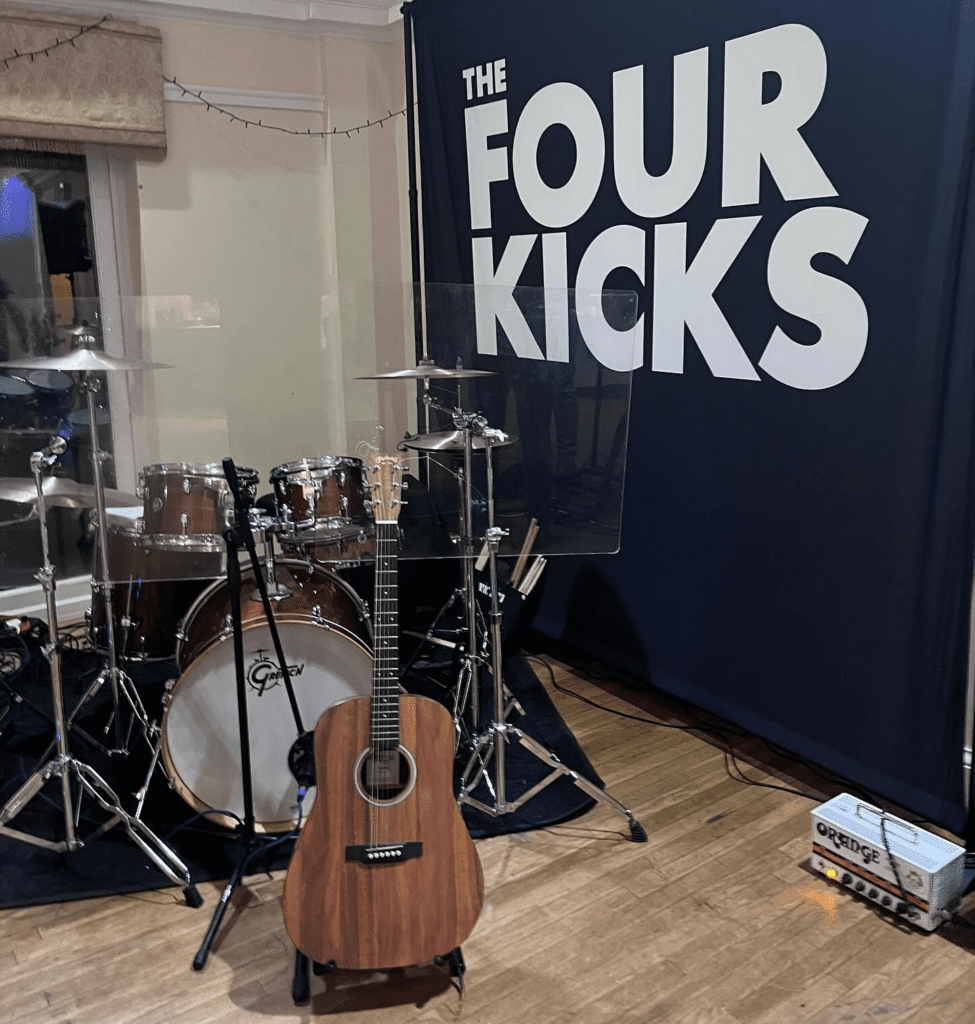Sound Limiters:
A Guide by The Four Kicks
Sound limiters, sometimes referred to as volume limiters and by several other similar names, are essentially monitoring devices installed in many venues to control noise levels.
They are electronic devices configured to a predefined volume or ‘threshold’ measured in (Decibels, or dB). Once that threshold is reached, they perform an action to reduce the volume level within the venue or space.
Volume limiters in music venues normally exist as one of the following two varieties:
The most common type. These are set to certain decibel (dB) threshold and, upon detecting sound exceeding these limits, will cut off power in the venue.
This setup tends to includes a visual indicator – often a traffic light system – to alert the band of the current sound level in relation to the limiter’s threshold, i.e. if the light is green, we are well within the limits, amber we are approaching the volume threshold and red, we really need to turn down quickly otherwise the power will shut down very soon.
These systems use a microphone in the room to detect volume levels, so with this type of limiter, it’s important for us to note that other ambient noises contribute to reaching the sound limit, for example people in the audience singing along.
We consider these to be the more challenging type of limiting device, particularly as when they do cut power, they tend to do so for around 10 seconds or so before starting the flow of electricity to our equipment again. This of course might not just happen once within a performance and does cause some disruption, so we need to be particularly careful when planning for your event.
Some venues ask that we run our audio through their in-house PA / Speaker System that features what’s called a “hard limiter” or a “brickwall limiter”.
Rather than cutting power to our electrical equipment, these use a circuit that limits the overall output to within a maximum volume level. Should our instruments and vocals exceed the defined threshold, they “compress” the audio to bring the volume down to their desired limit.
Why “brickwall”? Well, imagine a rubber ball (representing our sound) is being pushed up against a wall (representing the limiter’s threshold) until it gradually becomes squashed and distorted. This is a fair anology to describe what happens to sound going through these devices.
This effect isn’t necessarily detrimental and isn’t always likely to be audible or sound “bad” if managed correctly.
Having said that, it is just something that it’s helpful for us to be aware of, as we will adopt different mixing techniques and tools to ensure a clean and crystal clear sound under these circumstances.
While venues may prefer not to impose such restrictions, the adoption of sound limiters ensures compliance with local noise regulations and maintains friendly relations with the local community.
The Four Kicks are fortunately well-experienced in working with both kinds of set up, so are confident in our ability to deliver a great sound the vast majority of venues with limiters. It does mean we will approach things differently and spend a little more time planning our set up prior to the event and on the day, but it’s all par for the course.
Limits of 100dB or above usually pose no issues for live bands. At 95dB, most four-piece bands, including The Four Kicks, can still perform fairly comfortably with some adjustments. At 90dB and below, this is the point where a more acoustic style performance would likely be more suitable. Should your venue have a limiter configured this low, we will be happy to discuss options with you.
To put decibel levels into context:
- 80dB is akin to loud traffic noise from a distance of 7.5 meters.
- 90dB can be compared to the sound of an average petrol lawn mower.
- 100dB matches the volume of average headphones.
- 110dB is about the level of disco music at a club.
- 140dB is around the volume of a Boeing 747 on take-off.
Only the venue can inform you of the decibel limit / threshold of the space we perform in, but as we mention several times in this piece, we have no problem discussing these technical details with them directly on your behalf.
It turns out my venue has a limiter! What do I do?
Don't panic! We have you covered...
We are happy to speak to the venue directly on your behalf to iron out a lot of the technical details of working with volume limiters, however if you want to find out more yourself, typically we would ask these following questions:
- What type of sound limiter is installed and is the band required the use of your PA system?
- Where is the placement of the limiter's microphone in relation to where the live performance will take place?
- Is there any potential to move the performance area further away from the limiter's microphone?
- What is the specific decibel (dB) threshold / limit set on the sound limiter?
- What actions are taken by the sound limiter once it's activated by excessive volume?
- Do you have any advice to help us navigate the sound limiter more effectively?
The answers to these questions will then help us to make strategic decisions prior to the event.
Navigating Venue Restrictions with The Four Kicks:
Our Approach
By far the loudest instrument in a band is an acoustic drum kit and, unfortunately by their nature, they don’t have a volume control fitted!
We know that there’s something special about hearing and seeing real acoustic drums, so we do take measures to be able to use them in most circumstances. This isn’t always possible however, particularly when we’re limited to a sub 90dB volume limit. Under these conditions, we will discuss alternatives with you for your performance, whether this involves us using electric drums that allow us to turn down the volume, or the potentially using a more low-key acoustic style set up.
A ‘Baffle’ing Solution
Something that The Four Kicks do to try and save acoustic drum performances, and to balance this particularly loud instrument’s volume with the rest of the band, is to use acrylic screens called drum baffles / drum screens.
These sheets of clear acrylic redirect sound waves created by certain parts of the drum kit, like cymbals, away from entering the vocalists microphone directly. They can also enhance the listening experience by allowing us to get a cleaner mix overall.
We can expect reductions of 3-6dB from our normal stage volume using baffles, dependent on a variety of factors.
Are Electric Drums the Best Option for your Venue?
The Four Kicks’ drummer does own a high quality electric drum kit that is available for use in those venues that demand low volume levels, ensuring that no matter how exuberant the drumming, it will never exceed a certain level.
Ocassionally, venues will insist on us using their in-house electric kit, which we are also happy to do, subject to conversations with the venue directly regarding its technical specifications and suitability. Electric drums can definitely sound good if mixed well. We will take the time to craft the best sound possible within our 90 minutes set up time should we need to go down this route.

Can you see them?
These transparent sheets of acrylic material redirect sound waves created by the drum kit’s cymbals away from vocal microphones, allowing for a clearer overall sound and giving us greater volume control.
It’s very common practice now for bands not to use individual instrument amplifiers on stage nowadays, instead opting to feed all instrumentation and vocals through a centralised sound system (also known as a PA system) and using “in-ear monitoring” devices so that we can hear our performance clearly.
The Four Kicks use this method more often than not, since it allows for greater control of over all volume and overall mix. You will be able to hear every instrument and every detail in a very balanced way, without musicians needing to turn their personal amplifiers up too loud just to hear themselves on stage.
To Summarise
The Four Kicks are well-versed in handling sound limiters. These devices aren’t new to us, and our band has plenty of experience performing under their constraints—so there’s no need to worry! However, if you do have any questions, please don’t hesitate to drop us a message at band@thefoukicks.co.uk – we’d be happy to explain anything and work with you to get the best out of your performance.


